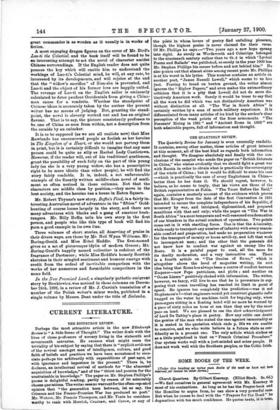THE QUARTERLY REVIEW.
The Quarterly Review for January is even unusually readable. It contains, among other matter, three articles of great interest at this moment, all of the best kind as regards both information and thought. We disagree absolutely and finally with the con- clusions of the essayist who sends the paper on "British Interests in China," who wishes evidently that we should fight a great war with Russia in order to obtain what is practically the sovereignty of the whole of China ; but it would be difficult to state his case —which is practically the case of every Englishman in China— better than he has done it. We should regret, however, to believe, as he seems to imply, that his views are those of the British representative at Pekin. " The Years Before the Raid," again, contains a masterly account of the evidence which proves that Mr. Kruger from the date of the first Convention in 1831 intended to secure the complete independence of his Republic, if necessary by war, and intrigued, diplomatised, and prepared munitions with that end only; while the paper on "The War in South Africa" is a most temperate and well-reasoned con demuation of our blunders in the actual conduct of operations. Two points come out in it with startling force. One is that the Admiralty, while ready to transport any number of infantry with every reason- able comfort and preparation, had made no preparation whatever for the transport of cavalry or horse artillery, and left that work to incompetent men; and the other that the generals did not know how to conduct war against an enemy like the Boers. It is a painful paper to read, all the more for its deadly moderation, and a very instructive one. There is a fourth article on "The Genius of Rome," which is altogether above the level of magazine writing, its root idea being that Rome his always been a centre of conflict between Emperor—now Pope patricians, and plebs ; and another on "Ocean Liners" positively choked with information. The writer, however, we fancy, will live to see that he is premature in sup- posing that ocean travelling has reached its limit in point of speed. He ignores too completely the prediction—was it not Stephenson's P—that engineers would yet construct gigantic rafts tugged on the water by machines built for tugging only, when passengers sitting in a floating hotel will no more be worried by a pace of sixty miles an hour at sea than they are by the same pace on land. We are pleased to see the slow acknowledgment of Lord De Tabley's place in poetry. How any critic can doubt the genius of the man who stated the case against immortality as it is stated in the quotation which ends p. 264 we are unable to conceive, and we who write believe in a future state as con- fidently as in a present one. The only article which strikes us as a little prejudiced is that on " French Criminal Procedure." Our system works well with a just-minded and sober people. It does not work well with the Southern peoples, or the Celtic Irish.


















































 Previous page
Previous page